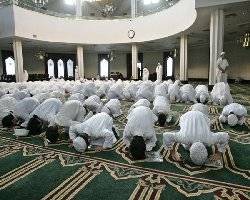Ramadan: An Invaluable Opportunity for the Youth - II
24/05/2016| IslamWeb
Examples of the diligence of the righteous predecessors:
These are some bright examples that highlight the diligence of the righteous predecessors in worshipping and obeying Allah The Exalted. Perhaps pondering over them would raise our morale and motivate us to perform extra acts of worship.
1 – The Prophet, ![]() , used to pray at night until his feet were swollen. When he was asked about it [although his past and future sins were forgiven], he,
, used to pray at night until his feet were swollen. When he was asked about it [although his past and future sins were forgiven], he, ![]() , said: “Should I not be a thankful slave?” [Al-Bukhari and Muslim]
, said: “Should I not be a thankful slave?” [Al-Bukhari and Muslim]
2 - Abu Bakr, may Allah be pleased with him, used to weep profusely, especially in prayer and when reciting the Noble Quran.
3 – ‘Umar, may Allah be pleased with him, had two dark lines etched on his cheeks because of his frequent weeping.
4 – ‘Uthmaan, may Allah be pleased with him, used to recite the Noble Quran in full in one Rak‘ah (unit of prayer).
5 – ‘Ali, may Allah be pleased with him, used to cry in his private room for prayer until his beard became wet with tears. He used to say, “O world! Go and beguile somebody else. I have divorced you thrice, an irrevocable divorce.”
6 – Qataadah ![]() used to recite the Noble Quran in full in seven days, and in Ramadan in three days, and once on each night of the last ten nights of Ramadan.
used to recite the Noble Quran in full in seven days, and in Ramadan in three days, and once on each night of the last ten nights of Ramadan.
7 – Sufyaan Ath-Thawri ![]() used to cry tears of blood out of his fear of Allah The Almighty.
used to cry tears of blood out of his fear of Allah The Almighty.
8 – Sa‘eed ibn Al-Musayyib  used to go to the mosque regularly. He did not miss a prayer in congregation for forty years!
used to go to the mosque regularly. He did not miss a prayer in congregation for forty years!
The traders of this world spare no effort in seizing any opportunity and doing whatever it takes to gain huge profits. Why do you not trade with Allah The Exalted? Why do you not compete in performing acts of worship and righteous deeds in order to earn the abundant profits and great rewards from Allah The Almighty?
Ramadan is one of the greatest opportunities that should be seized and fully utilized. It is a great season of rewards for which one should prepare himself. Observant people should not lose sight of such a great opportunity. Ramadan is the month of forgiveness, the month of winning
These are some tips that would help you to make full use of this blessed month and spend it in carrying out righteous deeds:
1 - Fasting is an act of worship and not just a custom:
The Prophet, ![]() , said: “Whoever observes fasts during the month of Ramadan out of sincere faith, and hoping to attain The rewards of Allah, then all his past sins will be forgiven.” [Al-Bukhari and Muslim]
, said: “Whoever observes fasts during the month of Ramadan out of sincere faith, and hoping to attain The rewards of Allah, then all his past sins will be forgiven.” [Al-Bukhari and Muslim]
This means that one should fast Ramadan out of his faith in Allah The Exalted and in His rewards for fasting. He should aspire to gain these rewards and not out of showing off or ostentation, or to gain money or prestige.
2 - Ramadan is a blessing and one should be grateful for it:
Think of those who have died before Ramadan. They can no longer carry out righteous deeds and their records of deeds have been closed for good. They cannot earn any reward or carry out a good deed, as simple as it might be.
Unlike them, Allah The Exalted extended your life until you witnessed Ramadan and He granted you the opportunity to earn all these abundant rewards. Indeed, this is a blessing that entails showing thankfulness and praise to Allah The Exalted.
3 - Sleeping and Staying up:
If you spend the days in Ramadan sleeping and waste its nights in frivolity, you would have deprived yourself of the rewards of fasting and night prayer. You may come out of the month empty-handed. Indeed, it is only a few days and memorable nights and the blessed month of Ramadan will end in an instant. Hence, one should strive in worship and devote his time to carry out acts of worship and good deeds in order to earn pleasure and bliss in the Hereafter. Beware of spending the month of Ramadan in heedlessness. The Prophet, ![]() , said: “Let the nose of that person be smeared with dust who has the opportunity to witness the month of Ramadan and it ends without being forgiven.” [At-Tirmithi and Al-Haakim] [Al-Albaani: Saheeh]
, said: “Let the nose of that person be smeared with dust who has the opportunity to witness the month of Ramadan and it ends without being forgiven.” [At-Tirmithi and Al-Haakim] [Al-Albaani: Saheeh]

